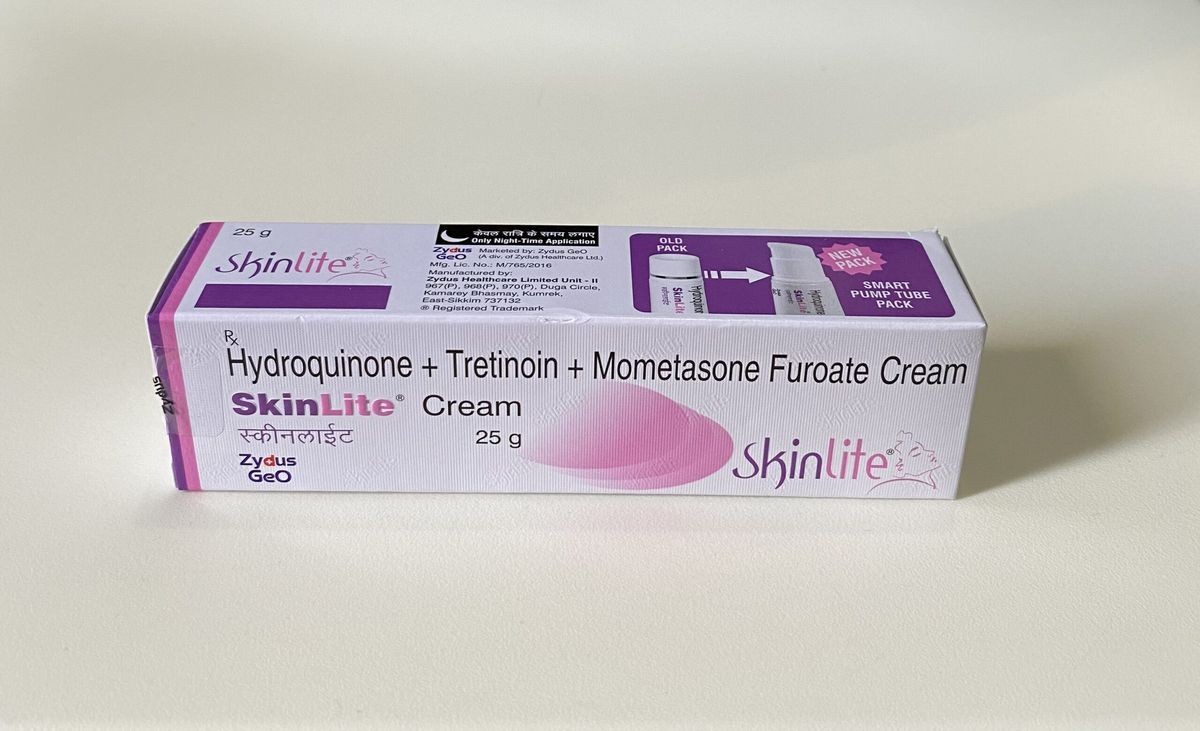
Contents
fluocinolone/tretinoin/hydroquinone
Fluocinolone/tretinoin/hydroquinone is a combination medication used for short-term treatment of melasma, a skin disorder that causes patches of dark skin discoloration to appear on the face, particularly on the cheeks and forehead.
Melasma occurs more commonly in women, often with pregnancy or the use of contraceptives or hormones. Fluocinolone/tretinoin/hydroquinone helps lighten the dark skin patches and is used in addition to measures to avoid sun exposure, including the use of sunscreens.
The three drugs in the combination work in different ways to treat melasma:
- Fluocinolone: a topical corticosteroid that decreases inflammation, itching, and constricts swollen blood vessels in the skin.
- Tretinoin: a vitamin A derivative that aids in loosening and shedding of dead skin cells and increasing skin cell turnover.
- Hydroquinone: inhibits the production of melanin, the pigment that causes dark skin color, by interfering with processes in melanocytes, the cells that produce melanin.
Warnings
- Avoid using fluocinolone/tretinoin/hydroquinone if you have hypersensitivity to any component of the formulation.
- This cream contains sodium metabisulfite, which may cause allergic reactions in some individuals. Discontinue use if allergic reactions occur and seek appropriate treatment.
- Hydroquinone in the formulation can cause gradual darkening of the skin (ochronosis), particularly in dark-skinned people. Discontinue use if ochronosis develops.
- The corticosteroid fluocinolone in the formulation may suppress the hypothalamic-pituitary-adrenal (HPA) axis, causing insufficiency of cortisol, the stress hormone. Excessive cortisol levels may lead to Cushing’s syndrome, hyperglycemia, and glucosuria. Children are more susceptible to systemic absorption.
- Mild to moderate local skin reactions may occur, including irritation, peeling, dryness, and itching. These reactions may be aggravated by the concurrent use of abrasive soaps and cleansers, astringent skin care products, or other irritating topical medications.
- Prolonged treatment with corticosteroids has been associated with the development of Kaposi’s sarcoma, a type of cancer.
- The safety and efficacy of fluocinolone/tretinoin/hydroquinone in darker skin have not been studied and may cause excessive bleaching.
- The safety and efficacy of fluocinolone/tretinoin/hydroquinone in the treatment of hyperpigmentation conditions other than facial melasma have not been studied.
- This treatment is intended for short-term use and not for long-term maintenance of melasma.
Side Effects
Common side effects of fluocinolone/tretinoin/hydroquinone include:
- Skin redness (erythema)
- Peeling skin (desquamation)
- Burning
- Dry skin (xeroderma)
- Itching (pruritus)
- Acne vulgaris
- Spider veins (telangiectasia)
- Skin irritation
- Changes in skin pigmentation (dyschromia)
- Small bumps in the skin (papules)
- Fluid-filled blisters (vesicles)
- Rash
- Acne-like rash
- Rosaceae
- Abnormal skin sensations (paresthesia)
- Reduced skin sensation (hypoesthesia)
- Dry mouth (xerostomia)
Less common side effects of fluocinolone/tretinoin/hydroquinone include:
- Inflammation of follicles (folliculitis)
- Acneiform eruptions
- Reduced skin pigmentation (hypopigmentation)
- Skin inflammation around the mouth (perioral dermatitis)
- Allergic contact dermatitis
- Secondary infection
- Sweat rash/prickly heat (miliaria)
- Loss of skin tissue (skin atrophy)
- Stretch marks (striae)
- Blue-black discoloration of the skin (ochronosis)
- Suppression of the stress axis (hypothalamic-pituitary-adrenal [HPA] axis) that reduces the production of the cortisol stress hormone
- Cushing’s syndrome, a disorder caused by excessive cortisol production due to systemic absorption of the corticosteroid
Contact your doctor immediately if you experience any of the following symptoms or serious side effects while using this drug:
- Fast or pounding heartbeats, fluttering in your chest, shortness of breath, and sudden dizziness
- Severe headache, confusion, slurred speech, severe weakness, vomiting, loss of coordination, feeling unsteady
- Severe nervous system reaction with very stiff muscles, high fever, sweating, confusion, fast or uneven heartbeats, tremors, and feeling like you might pass out
- Blurred vision, tunnel vision, eye pain or swelling, or seeing halos around lights
This is not a complete list of all side effects or adverse reactions that may occur from the use of this drug. Contact your doctor or report side effects to the FDA at 1-800-FDA-1088.
Dosages
Cream
- 0.01%/0.05%/4%/30 g
Adult:
Melasma
- Short-term treatment of moderate to severe melasma
- Apply to face at night, at least 30 minutes before bedtime
- Gently wash face before application; rinse and pat dry
- Apply a thin film of Tri-Luma to the hyperpigmented area and a ½ inch surrounding skin
- Avoid using occlusive dressing
Pediatric:
- Safety and efficacy not established
Overdose
- Overdose from topical application is unlikely.
- Oral ingestion may be harmful. For accidental ingestion, contact Poison Control.
Drug Interactions
Inform your doctor of all medications you are currently taking to avoid possible drug interactions.
- Severe interactions with fluocinolone/tretinoin/hydroquinone include: aldesleukin, aminolevulinic acid (systemic), multivitamins/fluoride (with A, D, E), multivitamins/minerals (with A, D, E, K), multivitamins/minerals (with A, E, no iron), aminolevulinic acid (topical), methoxsalen (systemic), porfimer, and verteporfin.
For more information on drug interactions, consult the RxList Drug Interaction Checker.
Always inform your doctor, pharmacist, or healthcare provider about all prescription and over-the-counter medications you use, as well as the dosage for each.
Pregnancy and Breastfeeding
- No adequate and well-controlled studies on the topical use of fluocinolone/tretinoin/hydroquinone in pregnant women. Use during pregnancy only if benefits outweigh risks.
- Unknown if the cream can pass into breastmilk. Use with caution in nursing mothers and avoid contact with the breastfed infant.
Additional Information
- Use fluocinolone/tretinoin/hydroquinone cream as prescribed. Do not use for any skin disorder other than what it is prescribed for.
- Do not apply excessive quantities and avoid prolonged use. Wash hands after each application.
- Switch to nonhormonal contraceptives while using fluocinolone/tretinoin/hydroquinone.
- Avoid contact with eyes, nose, angles of the mouth, mucous membrane, and open wounds.
- Avoid exposure to ultraviolet light and sunlight by using protective clothing and sunscreen.
- Use moisturizer after washing the face in the morning to prevent skin dryness.
- Discontinue use and consult with your physician if you develop hypersensitive reactions.
- Local irritation and other skin reactions may occur temporarily. Seek medical attention if irritation persists or if you experience blistering, burning, swelling, or allergic contact dermatitis.
- Store safely out of reach of children.
- In case of oral ingestion or overdose, contact your physician or Poison Control.
Subscribe to MedicineNet’s Skin Care & Conditions Newsletter
By clicking "Submit," I agree to the MedicineNet Terms and Conditions and Privacy Policy. I also agree to receive emails from MedicineNet and I understand that I may opt out of MedicineNet subscriptions at any time.
Summary
Fluocinolone/tretinoin/hydroquinone is a combination medication used for short-term treatment of melasma, a skin disorder that causes patches of dark skin discoloration to appear on the face, particularly on the cheeks and forehead. Common side effects include skin redness, peeling skin, burning, dry skin, itching, acne vulgaris, spider veins, skin irritation, changes in skin pigmentation, small bumps in the skin, fluid-filled blisters, rash, acne-like rash, rosaceae, abnormal skin sensations, reduced skin sensation, and dry mouth. Consult your doctor before use if pregnant or breastfeeding.
Fluocinolone/tretinoin/hydroquinone is a combination medication used for short-term treatment of melasma, a skin disorder that causes patches of dark skin discoloration to appear on the face, particularly on the cheeks and forehead. Common side effects include skin redness, peeling skin, burning, dry skin, itching, acne vulgaris, spider veins, skin irritation, changes in skin pigmentation, small bumps in the skin, fluid-filled blisters, rash, acne-like rash, rosaceae, abnormal skin sensations, reduced skin sensation, and dry mouth. Consult your doctor before use if pregnant or breastfeeding.


